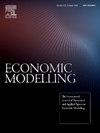Job switching and bequest motives in an optimal consumption–investment model under inflation and mortality risks
IF 4.7
2区 经济学
Q1 ECONOMICS
引用次数: 0
Abstract
This study presents a unified model for analyzing optimal consumption, investment, and life-insurance decisions under the combined effects of inflation risk, mortality risk, and reversible job-switching opportunities. In the model, individuals dynamically choose between two job states with distinct income–leisure trade-offs while allocating wealth across a complete financial market that includes inflation-linked bonds, stocks, and bank deposits. Using the martingale approach, we derive closed-form solutions and conduct comparative statics to examine how life expectancy, bequest motives, inflation, and leisure preferences jointly influence individual financial decision-making. The results show that mortality risk and bequest motives have opposing effects on the wealth threshold for job switching, offering new theoretical insights beyond prior studies, which typically consider these factors in isolation. Furthermore, we demonstrate that job-switching flexibility can significantly enhance consumption and investment outcomes, especially in inflationary environments. The model is further extended to incorporate stochastic labor income and job-switching costs, capturing more realistic labor market frictions and income uncertainty. Although these extensions do not yield closed-form solutions, the theoretical frameworks provide a foundation for future research using partial differential equation methods. Overall, the proposed framework delivers strong explanatory power and meaningful policy implications for retirement planning, life-insurance design, inflation-hedging strategies, and the development of flexible labor market policies.
通货膨胀和死亡风险下最优消费-投资模型中的工作转换和遗赠动机
本文提出了一个统一的模型,用于分析通货膨胀风险、死亡风险和可逆转业机会共同作用下的最优消费、投资和寿险决策。在该模型中,个人动态地在两种工作状态之间进行选择,这两种工作状态具有不同的收入和休闲权衡,同时在一个完整的金融市场中分配财富,包括与通胀挂钩的债券、股票和银行存款。使用鞅方法,我们推导出封闭形式的解决方案,并进行比较统计,以检验预期寿命、遗产动机、通货膨胀和休闲偏好如何共同影响个人财务决策。结果表明,死亡风险和遗赠动机对换工作的财富门槛有相反的影响,这为以往的研究提供了新的理论见解,这些研究通常是孤立地考虑这些因素的。此外,我们证明了工作转换灵活性可以显著提高消费和投资结果,特别是在通货膨胀环境下。该模型进一步扩展,纳入随机劳动收入和工作转换成本,捕捉更现实的劳动力市场摩擦和收入不确定性。虽然这些扩展没有得到封闭形式的解,但理论框架为未来使用偏微分方程方法的研究提供了基础。总体而言,所提出的框架为退休计划、人寿保险设计、通胀对冲策略和灵活劳动力市场政策的制定提供了强大的解释力和有意义的政策含义。
本文章由计算机程序翻译,如有差异,请以英文原文为准。
求助全文
约1分钟内获得全文
求助全文
来源期刊

Economic Modelling
ECONOMICS-
CiteScore
8.00
自引率
10.60%
发文量
295
期刊介绍:
Economic Modelling fills a major gap in the economics literature, providing a single source of both theoretical and applied papers on economic modelling. The journal prime objective is to provide an international review of the state-of-the-art in economic modelling. Economic Modelling publishes the complete versions of many large-scale models of industrially advanced economies which have been developed for policy analysis. Examples are the Bank of England Model and the US Federal Reserve Board Model which had hitherto been unpublished. As individual models are revised and updated, the journal publishes subsequent papers dealing with these revisions, so keeping its readers as up to date as possible.
 求助内容:
求助内容: 应助结果提醒方式:
应助结果提醒方式:


